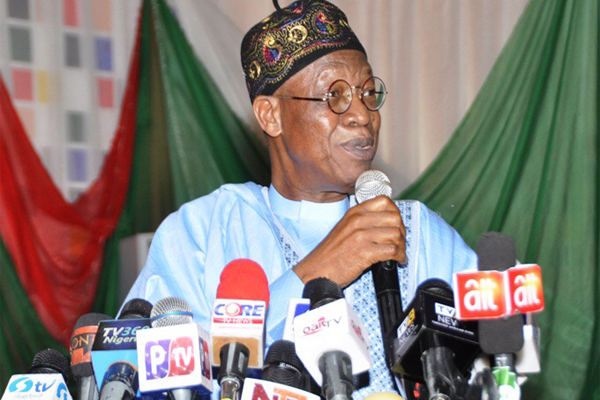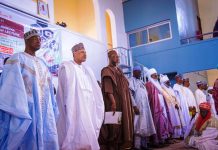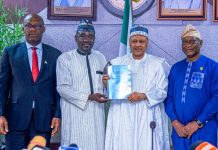Gentlemen of the media, good afternoon and welcome to this press conference, which I have called to give a third-year scorecard of the Buhari Administration, which is just a few days away.
2. Before I go into specifics, let me say, unequivocally, that this Administration has kept its social contract with the Nigerian people by delivering on its campaign promises. We are putting our nation on the path of sustainable growth and development, diversifying our economy like never before, tackling corruption at its very core and devising creative measures to secure lives and property.
3. After just three years, Nigeria is rising again like a phoenix from the ashes of years of massive looting of the national treasury, misgovernance and fallen oil prices. Under the able, focused and patriotic leadership of President Muhammadu Buhari, this Administration has recorded many firsts in so short a time, achievements that are beginning to impact positively on the lives of Nigerians.
4. Let me cite some of those unprecedented achievements:
– In just three years, the Buhari Administration has taken power generation to an all-time high of 7,000 Mega Watts, from the 2690 which we inherited.
– In just three years, the Buhari Administration has taken distributable power to an all-time high of 5,000MW
– In just three years, this Administration has moved Nigeria closer to self-sufficiency in rice more than an Administration before it. It’s just two years away from meeting its target production of 6 million MT of milled rice, meeting Nigeria’s consumption.
– In just three years, this Administration has increased the number of rice farmers from 5 million to an all-time high over 11 million
– In just three years, this Administration has cut Nigeria’s rice import bill of $1.65billion annually by 90%, the highest such cut ever.
– In just three year, this Administration has slashed leakages in government spending that made corruption possible, thanks to the diligent implementation of the Treasury Singles Account (TSA) and the hugely-successful Whistle-Blower Policy
– In just three years, this Administration is feeding 8.2 million pupils in 45,394 schools in 24 states, employing 87,261 cooks in the process
– In just three years, this Administration has been paying conditional cash transfer of N5,000 monthly to 297,973 poorest and most vulnerable households.
– In just three years, this Administration has delivered 10 million, 50kg bags of feritilizer at a low price N5,500 (for 2017 alone). The country now has annual savings of US$200 million in foreign exchange and ₦60 billion annually in budgetary provisions for Fertilizer subsidies.
– In just three years, this Administration is turning around the nation’s infrastructural fortunes, including power, roads and rail, thanks to the unprecedented 2.7 trillion Naira ($9billion) that has been spent on infrastructure.
– In just three years, this Administration has raised capital expenditure in the yearly national budget to an unprecedented 30% on the average
– In just three years, this Administration has taken its investment in people, through the unprecedented Social Investment Programme (SIP), to a great height. All four components of the N-POWER Programme are now up and running, benefiting 9 MILLION PEOPLE directly: N-POWER, GEEP, HOME-GROWN SCHOOL FEEDING PROGRAMME AND CONDITIONAL CASH TRANSFER.
– In just three years, this Administration has retaken every inch of Nigeria’s territory from insurgents, flushed them out of their safe havens and put them on the run. These are monumental achievements, unprecedented in the history of our country.
WHERE WE ARE COMING FROM
5. For those who are tempted to belittle our achievements, let me quickly say that on 29th of May 2015, when President Buhari was reeling out his agenda for the nation, Boko Haram was squarely iin charhe of a territory the size of Lebanon, occupying 24 local governments, collecting taxes, deposing and installing emirs and hoisting its flag; corruption levels
in our society was at an all-time high and the economy was in the doldrums.
6. Today, we are making strong and steady progress in the three priority areas we set for the nation: Economy, Security and the Fight against corruption. Facts don’t lie, as the saying goes. So, we will now use facts and figures to prove this point and showcase the achievements of the Buhari Administration in three years!
7. Let’s start with the ECONOMY. The Economy is back on the path of growth, after the recession of 2016-17
– The economy grew 1.95 percent in Q1 2018
– Consistent growth was achieved in the priority sectors of Agriculture and Solid Minerals throughout the recession.
– Inflation has fallen for 15 consecutive months, from 18.7 percent to12.5 percent as of April 2018.
– External Reserves of $48 billion are the highest in 5 years, and more than double the $23 billion we met in 2015
– Total exports in 2017 were 59.47% higher than for 2016
– In 2017, agriculture exports grew 180.7% above the value in 2016
– In 2017, raw material exports grew 154.2% above the value in 2016
– In 2017, solid minerals exports grew 154.2% above the value in 2016
– In 2017, exports of manufactured goods grew 26.8% above the value in 2016
– The first quarter of 2018 saw the fourth consecutive quarterly increase in capital importation since Q2 2017. The total value of capital imported in the quarter stood at $6,303.63 billion, which is a year on year increase of 594.03%, and a 17.11% growth over the figure reported in the previous quarter.
– The new FX Window introduced by the CBN in April 2017 now sees an average of $1 billion in weekly turnover, and has attracted about $45 billion in inflows in its first year, signalling rising investor confidence in Nigeria
– Nigeria’s Stock Market ended 2017 as one of the best-performing in the world, with returns of about 40 percent.
– Five million new taxpayers have been added to the Tax Base since 2016, as part of efforts to diversify Government revenues, bring the total to 19 million taxpayers
– Tax Revenue increased to N1.17trn in Q1 2018, a 51% increase on the Q1 2017 figure.
– 2.7 Trillion Naira spent on Infrastructure in 2016 and 2017 fiscal years, an unprecedented allocation in Nigeria’s recent history.
– Fourteen moribund Fertilizer Blending Plants revitalized so far under the Presidential Fertilizer Initiative (PFI); with a total capacity of 2.3 million MT of NPK fertilizer
– The contribution of Solid Minerals’ to the Federation Account rose five-fold from N700 million in 2015 to N3.5 billion in 2017.
– The Administration launched the Economic Recovery and Growth Plan (ERGP), a medium-term Economic Plan, in April 2017 to chart a course for the Nigerian economy over the next four years (2017–2020). The Vision of the ERGP is to restore economic growth, invest in Nigerians, and to build a globally competitive economy, and the Plan aims to
achieve these by focusing on five execution priorities:
– The creation in April 2017 of a New FX Window for Investors and Exporters has helped stabilize the market. The new Window has attracted inflows of more than $45 billion in its first year of operation.
– In 2017, the Federal Government successfully issued US$4.5billion Eurobonds in the International Capital Market (ICM), US$4 billion was for the part-financing of the deficits in the 2017 Budget (US$1.5billion) and 2018 (US$2.5billion).
– The Eurobonds were not only highly oversubscribed, but Nigeria was able, for the first time, to issue a tenor of 30 years. The significance of the US$1.5billion Eurobond issued in November 2017 for 30 years is that Nigeria became the second country in Africa (after South Africa) to issue a tenor that long. In addition, the 30-year tenor was also ideal for financing capital projects which are long-term in nature. The balance of US$500 million was used to redeem NTBs which matured in December 2017.
– Also for the first time, Nigeria issued a Diaspora Bond in the International Capital Market. The Diaspora Bond was US$300 million with a tenor of 5-years. The proceeds were used to part-finance the 2017 Budget.
– Under President Buhari’s administration, the Federal Government introduced 3 new products in the domestic market to promote financial inclusion, finance specific capital projects and offer local investors more products to enable them diversify their investment portfolio. These were N100 billion Sukuk bond to finance 25 Road Projects across the country, N10.69billion debut Green Bond to fund infrastructure projects that tackle climate change and the FGN Savings Bond.
– The Buhari Administration has extended more than 1.9 Trillion Naira to State Governments, to enable them meet their salary and pension obligations, especially in the face of dwindling oil revenues over the last two years. The support has come in the form of budget support facility, Paris Club Refunds and Infrastructure Loans
– The new Development Bank of Nigeria (DBN) has finally taken off, with initial funding of US$1.3bn (provided by the World Bank, German Development Bank, the African Development Bank and Agence Française de Development) to provide medium and long-term loans to MSMEs. It was licensed by the Central Bank in 2017, and has already made available the sum of 5 billion Naira to three Microfinance Banks, for on-lending to MSMEs.
– Bank of Industry has disbursed more than 160 billion Naira in loans since 2016. It has also established a 5 Billion Naira Fund for Artisanal Miners, as part of the Federal Ministry of Mines and Solid Minerals Development’s Programme to boost Mining activities in Nigeria.
– The Ease of Doing Business Reform Successes: Nigeria moved up 24 places on the World Bank’s Ease of Doing Business rankings in 2017, and earned a place on the List of 10 Most Improved Economies.
– The Nigerian Sovereign Investment Authority (NSIA) has seen inflows of US$1.15 billion under the Buhari Administration (the first inflows since the original US$1bn which the Fund kicked off with in 2012).
8. INFRASTRUCTURE
The Buhari Administration has demonstrated a single-minded commitment to upgrading and developing Nigeria’s Transport, Power and Health Infrastructure.
– In May 2018, the Federal Government launched the Presidential Infrastructure Development Fund (PIDF), under the management of the Nigerian Sovereign Investment Authority. The PIDF is kicking off with seed funding of US$1.3 billion. Funding for critical projects will no longer be a problem.
– Nigeria Sovereign Investment Authority (NSIA) in March 2018 invested US$10m to establish a world-class Cancer Treatment Center at the Lagos University Teaching Hospital (LUTH), and US$5m each in the Aminu Kano University Teaching Hospital and the Federal Medical Centre, Umuahia, to establish modern Diagnostic Centres. These Centers should be completed before the end of 2018.
– In 2014, the Federal Government spent these sums on the following sectors: Transport (N14bn), Agriculture & Water (N34bn), Power, Works & Housing (N106bn). In 2017 those figures jumped to: Transport (N127bn), Agriculture & Water (N130bn), Power, Works & Housing (N325bn).
– Road Projects are ongoing across every State of the country; many of these projects had been abandoned in recent years because of mounting debts owed by the Federal Government to contractors.
– The Buhari Administration issued a 100 billion Naira Sukuk Bond in 2017, Nigeria’s first sovereign Sukuk Bond. Proceeds from that Bond are funding 25 major road projects equally distributed across the six geopolitical zones of Nigeria.
– Upgrade of Nigeria’s 3,500km network narrow-gauge railway network has commenced, with the signing, in April 2018, of the interim phase of a concession agreement between the Government of Nigeria and an International Consortium led by General Electric (GE). The target of this Interim Phase is that within the next 12 months, passengers will
experience reduced travel time by rail between Lagos and Kano, and, for the first time in over a decade, contracted and scheduled freight rail services will be available. The construction of the Lagos-Kano Standard Gauge Rail has also started.
– Abuja’s Light Rail system has been completed and will go into operation in 2018. The first line to be launched will connect the city center with the Airport, with a link to the Abuja-Kaduna Railway Line.
– The Buhari Administration successfully completed the reconstruction of the Abuja Airport runway within the scheduled six-week period (March-April 2017).
– More than 70 Ecological Fund projects awarded and completed by the Buhari Administration, across the six geopolitical zones of Nigeria (Flood Control, Erosion Control, Bridges and Dams, Channelization and Desilting, etc)
9. POWER
– There will be more than 2,000MW of additional power generation capacity by the end of 2018, in addition to the 7,000MW currently being generated.
– Launch of the 701 billion Naira Payment Assurance Programme designed to resolve the liquidity challenges in the Power Sector by guaranteeing payments to Generating Companies and Gas Suppliers, gas eased generation of power.
– Transmission Expansion and Rehabilitation Programme has resulted in a 50 percent expansion in Grid Capacity since 2015, from 5,000MW to 7,125MW as at December 2017.
– FEC has approved Distribution Expansion Programme (DEP) to increase distribution capacity in collaboration with the DisCos.
10. FIGHT AGAINST CORRUPTION
– The Whistleblowing Policy introduced by the Federal Ministry of Finance in December 2016 has since yielded the following in recoveries:….N13.8bn from tax evaders, N7.8bn, $378million, £27,800 in recoveries from public officials targeted by whistleblowers.
– 8.1 trillion Naira was discovered to have been underpaid to the Federation Account between 2010 and 2015 by 15 revenue-generating agencies.
– MDAs are remitting more money to Federation Account. From remitting only N51 million between 2010 and 2016, JAMB went on to remit N7.8 billion in 2017, and is on course to remit a similar amount in 2018.
– As at March 2018, the TSA had recorded inflows of a total sum of N8.9 Trillion from Federal Ministries, Departments and Agencies (MDAs).
– Deployment of BVN for Payroll and Social Investment Programmes:
– The Creation of Efficiency Unit (EU) to spearhead the efficient use of government resources, and ensure reduction in Recurrent Expenditure has resulted in N17 billion in savings on travel, sitting allowances and souvenirs.
10. SECURITY
North-east
– To a large extent, security and normalcy have been restored to the North-East. Th
e Multi-National Joint Task Force (MNJTF), aimed at combating trans-border crime and the Boko Haram insurgency, has been rejuvenated
– El-Kanemi Warriors Football Club has returned to their home base in Maiduguri (in April 2016), two years after relocating to Katsina State because of the insurgency
– Emirs of Askira and Uba returned home in May 2016, two years after fleeing their palaces on account of the Boko Haram insurgency
– Public Secondary Schools resumed in Borno State on Monday September 26, 2016, after two years of closure
– Maiduguri-Gubio and Maiduguri-Monguno Roads reopened in December 2016, after being closed for three years.
– Capture of Boko Haram’s operational and spiritual headquarters,“Camp Zero”, in Sambisa Forest, in December 2016. Following this the Nigerian Army conducted its Small Arms Championship from 26th to 31st March 2017, a measure aimed at enabling the Armed forces to dominate the area, and avoid regrouping by the terrorists.
– Arik Air resumed flights to Maiduguri in May 2017, three years after suspending operations to the city.
– Nigerian Military reopened Maiduguri-Bama-Banki Road in March 2018, four years after it was seized by Boko Haram.
– More than a million displaced persons have returned to their homes and communities across the Northeast, since 2015.
– More than 13,000 Boko Haram hostages have been freed from Boko Haram captivity, including 106 of the Chibok Girls abducted in April 2014, and 105 of the Dapchi Girls abducted in February 2018.
In North Central, where there have been incessant clashes between herdsmen and farmers:
– Deployment of a Joint Military Intervention Force (JMIF), comprising Regular and Special Forces personnel from the Army, Air Force and Navy, and working in collaboration with the Nigeria Police Force, Department of State Security (DSS), and Nigeria Security and Civil Defense Corps (NSCDC).
– On Monday 14th May, 2018, Chief of Army Staff, Lt.-Gen. Tukur Buratai, flagged-off the Army’s newly-established 2 Battalion Forward Operating Base (FOB) in Kanfanin Doka Village, Birnin-Gwari, Kaduna State.
– Establishment of a new Area Command and two additional Divisional Police Headquarters in the Birnin Gwari Local Government Area of Kaduna State.
– In May 2018, the JMIF kicked off ‘Operation Whirl Stroke’, to counter armed herdsmen and militia groups operating in and around Benue, Nasarawa, Taraba and Zamfara States.
– Establishment by Nigerian Air Force of Quick Response Wings (QRW) in Benue, Nasarawa and Taraba States, and deployment of Special Forces to these QRWs.
– The Nigeria Police Force has recently inaugurated a new Mobile Squadron in Takum, Taraba State.
There are also other successful military Operations across the country to battle different security situations. To name a few:
– Operation Lafiya Dole, and Operation Last Hold, to defeat Boko Haram, in the Northeast
– Operation Whirl Stroke, operating in Benue, Nasarawa, Taraba and Zamfara states, to tackle the menace of armed herdsmen, cattle rustlers, communal militias, kidnappers and other bandits.
– Exercise Crocodile Smile I (September 2016) and II (October 2017) to curtail the menace of militant activities in the Niger Delta:
– Exercise Obangame, a multinational operation aimed at securing and protecting the Gulf of Guinea.
– Operation Awatse, a joint operation between the Military and the Police, in South West Nigeria, to flush out militants and pipeline vandals. Commenced July 2016, and still ongoing.
– Exercise Python Dance I (November 2016) and II (September 2017) in the South East, to tackle kidnappers and militant elements.
– There have also been major arrests of criminals across the country, including Usman Mohammed, aka Khalid Al-Barnawi, leader of the Ansaru Terrorist group and one of the most wanted terrorists in the world, with a US$6m United States bounty on his head. He’s currently being prosecuted alongside his accomplices; Amodu Omale Salifu, leader of an ISIS affiliate group active in North Central Nigeria, plotting to bomb foreign embassies; Ansaru leaders, Ahmed Momoh and Al-amin Mohammed Jamin, both confirmed associates of a prominent Ansaru kingpin terrorising residents in Kogi and Edo states.
11. CONCLUSION
Gentlemen, these are just a few of the achievements of the Buhari Administration in the past three years. Where many saw challenges, we saw opportunities. Where many saw impossibilities, we saw possibilities. We surmounted every opposition on our path to deliver on our promises to Nigerians. While naysayers pretended to be blind to our achievements, Nigerians who are being positively impacted by the good works of President Buhari applaud and appreciate our efforts, from the feedback we are getting.
They know that no government in the history of our country has ever done so much with so little. They know and acknowledge the sincerity, transparency and accountability of the Buhari Administration. They know and support the Administration’s diversification effort, which is paying off. We must be able to own our own future. We cannot be a hostage to oil price or production levels. That means taking back control of our economy and making it productive, and delivering value for ALL of our people. That’s exactly what we are doing.
By building an economy that is no longer reliant on income from one commodity, thanks to the ongoing diversification process, we will be creating a sustainable basis for long-term and inclusive growth for ALL.
We are keenly aware that Government must be accountable, and this government is very accountable. We are
providing security, we are providing an enabling environment for business and we are delivering strong and effective public services. We want to assure Nigerians that we will continue to deliver on our campaign promises.
I thank you all for your kind attention






